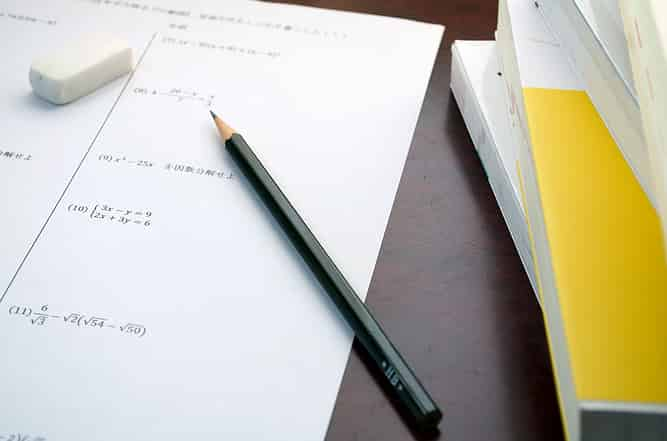
By Priyam, IvyWise Master Tutor
The SAT and ACT Math sections can be intimidating for many students – even those who do very well in their high school mathematics classes. However, the reality is that both the SAT and ACT test math concepts that high school juniors have typically already covered in their high school math courses. So, in some cases, it’s not the material that students struggle with, but how the questions are presented on the exams – which differs greatly from what is traditionally tested on high school math exams.
Also unlike math exams in the classroom, there is no way to earn partial credit, so if you commit a computational error, neither exam will be forgiving.
While there are numerous strategies to help you improve your score, some of which we will discuss below, the most important things that students can do in their test prep are to learn the material and study the way that these exams ask questions. These will help create a foundation that will allow you to tackle any question, regardless of difficulty.
Memorization
While the SAT provides students with a reference formula sheet, the ACT does not, so many students go into their test prep thinking that memorizing formulas is only beneficial when taking the ACT. However, it is helpful to understand the formulas when preparing for both the SAT and ACT Math, so you don’t have to continually refer to them. Know concepts like special triangles and be able to recognize them immediately. Memorize your multiplication tables, factors, denominators, and any other information that can help conserve time without sacrificing performance. For many easy questions, simply memorizing the key items above can often yield the answer. For difficult questions, memorizing formulas/numbers can help prevent unnecessary work and computational or careless mistakes, and help arrive at the answer more quickly.
Mathematical Paraphrasing
Many times a question may be difficult because of initial misunderstanding or interpretation of the problem. If a geometric or pictorial problem is described in words, sketch it out. It is much easier and faster to process the question by looking at a drawing than trying to recreate it in your head. Similarly, rewrite complicated word problems into a simple mathematical language. As a general rule, it is both more difficult and more time-consuming to solve complex problems by picturing them in your head. So take time to first create sketches or take notes before attempting to solve them.
Calculator Use
If a problem can be solved with a calculator, but doing so will involve multiple calculations, chances are you are missing something about the question. Look at the problem again, and determine if there are ways to simplify the expression given so that your calculator will only have to perform short, simple tasks. This is typically the case, and it will save you time that you can reinvest in other problems on the exam.
Mastering Content
You have to master several subjects in the Math sections of the SAT and ACT. At the high level, you need to know basic algebra, advanced algebra, data analysis, and geometry. Even further, within algebra, you need to know how to solve equations, how to deal with word problems, properties of functions, etc.
If you are not comfortable with the underlying math concepts in a subject – maybe you forgot how to solve a type of problem, or you forgot a formula to use, or you just don’t remember the subject material – then you’ve spotted an opportunity to improve your score.
The SAT and ACT have an uneven balance of questions by skill with algebra dominating both tests, and even though algebra and geometry may have the greater number of questions, you still have to know many of the topics in trigonometry and higher order math.
What students (even math whizzes) find annoying about both the SAT and ACT Math sections is that there are a lot of skills that show up just a few times on a test, but can negatively impact your score. For example, concepts like high level trig, complex numbers, synthetic division of polynomials, probability, and other less frequently tested material, can show up on an exam only once or twice, and if you’ve spent most of your time prepping for other concepts, these can come as a surprise and bring your score down if you’re not prepared. The appearance of some of these skills isn’t guaranteed from one test to another, meaning you might not even get a question on some of these math skills but you have to know them anyway.
You need a wide breadth of knowledge, as well as depth of mastery in each subject. No single test is going to test the entire breadth of your knowledge, but you must be prepared anyway.
Mistakes
Be diligent about understanding your mistakes. Every mistake you make on a test happens for a reason, and if you don’t understand exactly why you missed that question, you will make that mistake over and over again. It is important to find the source of each mistake, which requires being proactive.
On every practice test or question set that you take, mark every question you get wrong or which you are even 20% unsure about and review. This way, even if you guessed a question correctly, you’ll make sure to review it. Perhaps write down the gist of the question, why you missed it, and how to avoid that mistake in the future.
It’s important for students to recognize that in addition to the strategies already presented, the best way to crack even the most difficult of questions on the SAT or ACT is to practice! Test prep, including taking multiple practice tests, can go a long way toward helping you master the Math sections of the SAT or ACT, and, ultimately, help you reach your goal score.
If you’re struggling with SAT or ACT Math sections, or need help with another section on either exam, our team of test prep experts is here to help! Contact us today for more information on our tutoring and test prep services!


